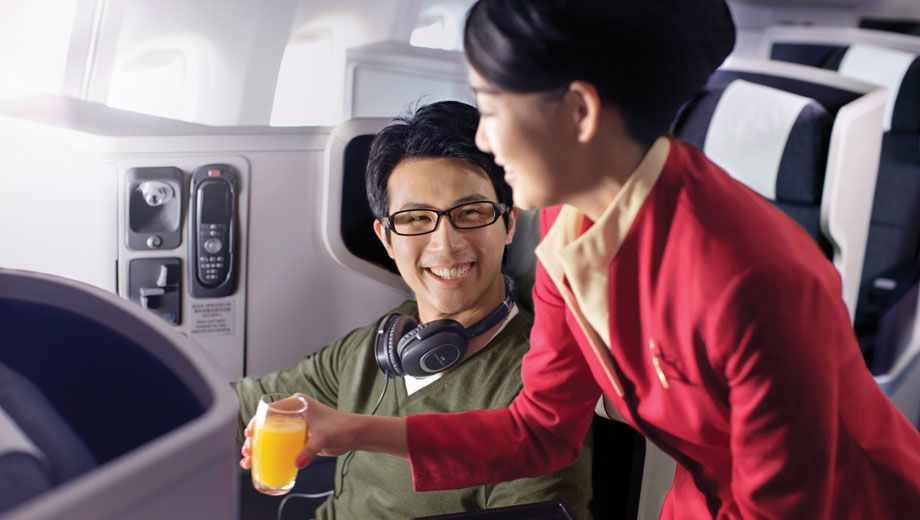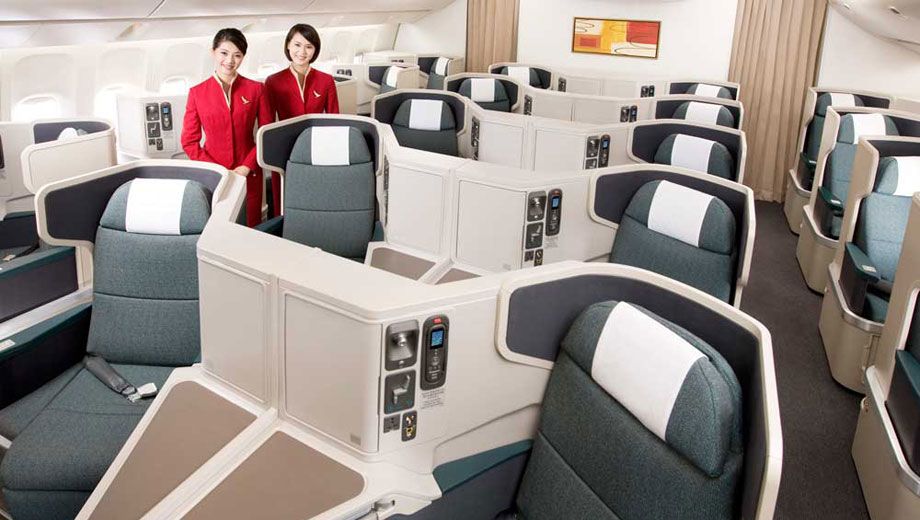Should airlines prioritise free seats for their own frequent flyers?

TALKING POINT | As Cathay Pacific plots a sweeping review of its Marco Polo Club loyalty scheme, the airline is reportedly looking to set aside more free seats for its own frequent flyers – but fewer seats for members of Oneworld 'partner' airlines such as Qantas, American Airlines and British Airways.
The move would be most keenly felt in the business class and first class cabins, where the supply of seats is at a premium to begin with.
Citing "sources close to the ongoing review, the South China Morning Post reports "the plan is to slash the number of free air tickets available for partner airlines and to reallocate those to Cathay's own Marco Polo Club members."
Cathay Pacific is believed to be particular sensitive to the seemingly limitless millions of miles which members of American Airlines' Aadvantage reward scheme can earn through credit card schemes and then use to snare seats ahead of even top-tier Marco Polo Club members.
"The sources say Cathay believes it is time to stop allowing external redemptions when the airline is capable of filling aircraft with paid passengers, boosting long-term profitability" writes the SCMP's Danny Lee.
At the same time, the airline is also said to be considering raising the miles-per-seat redemption rates.
Cathay Pacific won't be drawn on this aspect of what's tipped to be a wide-reaching revamp of the Marco Polo Club, with a spokesperson for the airline telling Australian Business Traveller only that "this is a comprehensive review and no decisions have been made regarding specific enhancements that we may introduce to our programme."
It's an interesting issue, and one which in theory could put an airline at odds with its erstwhile partners.
(And it's worth noting that Qantas' dramatic changes to its frequent flyer scheme in 2014, which slashed the number of status credits earned through its Oneworld partners, was clearly intended to reward loyalty to Qantas first and other airlines second. And some would argue this is exactly as it should be.)
We'd suggest that most Qantas Frequent Flyer members would expect to have first dibs on redeeming their points for a business class or first class seat, ahead of members of any other airline.
if that's so, then is it unreasonable for another airline to follow the same practice, and for that airline's own home-grown frequent flyers to have the same expectation?
In other words: to what extent should an airline look after its own loyal customers, ahead of anybody else's?
Follow Australian Business Traveller on Twitter: we're @AusBT


12 Feb 2013
Total posts 47
The article also states that a Senior Manager from Qantas Loyalty has been drafted in from Australia to spearhead the proposed changes to Marco Polo Club/Asia Miles. So if anything, the result of the revamp of the two schemes could be like the current structure of the Qantas Frequent Flyer programme.
04 May 2015
Total posts 261
You know you've hired someone from Qantas Loyalty when your airline starts using the word 'enhancements'...!
12 Feb 2015
Total posts 89
The SCMP article uses the term 'drafted' and says that the manager used to work with Virgin Aust and Britain's Nectar loyalty schemes. I'm presuming he's been hired by Cathay and left Qantas, as it's hard to envisage Qantas lending someone to Cathay. ;-)
Virgin Australia - Velocity Rewards
19 Mar 2014
Total posts 567
As much as I don't like the restraints on where I spend my points, I totally agree that the airline's own loyalists should take priority. Imagine if you went to cash in some points on a Qantas reward flight some 10 months out and all those seats were booked by members of another airline.... oh wait!
Qantas - Qantas Frequent Flyer
19 Nov 2011
Total posts 243
I tend to agree on the premium seats.
For Y seats though (at least), perhaps some leniency on that redemption to partner airlines.
If there were last minute unsold or unredeemed seats, perhaps open to partner redemptions is a viable option rather than flying empty.
24 Mar 2015
Total posts 17
The title of your article is completely misleading - there is no such thing as a free seat - whether people other than direct flyers on that airline use a seat (either by buying points or acruing points on partner airlines) they have always paid - so that seat is never "free" and therefore the whole argument about this issue is flawed....
21 Apr 2012
Total posts 3006
auspointer,
The issue of seats being "free" is a technicality that does not nullify the essence of the argument. To suggest so is in itself misleading.
QFF
12 Apr 2013
Total posts 1563
"[Qantas] was clearly intended to reward loyalty to Qantas first and other airlines second."
This is nowhere what I feel. It is almost impossible to secure QF business seat for long-haul overseas flight (forget first!) - all I can see is Emirates and JQ.
From customer prospective of view whole scheme truly sux - it is loyalty scheme, yet it is almost impossible to utilize those loyalty point and truly impossible to do so on QF flights! All Qantas does is pushing QFF member to rid off points in store and hotels. Number of seats unknown and never disclosed while I believe it should be knows and fixed. All upgrades are rubbish - it should be known at stage of ticket purchasing and left over seats should be available for upgrade at the gate at discount rate.
Well all this no more then dreams that some may call paranoid delusion.
21 Apr 2012
Total posts 3006
I can appreciate the reactive instinct for Marco Polo redemptions to be a closed shop. There is much appeal for limiting rewards at the pointy end to your own members. It might even play to a domestic audience to tout those changes to the programme, even if in reality it does not pan out.
However I believe no matter what changes takes place, there will always be people who will identify and exploit the system to their own benefit.
Notwithstanding that, I find the arguments quite amusing. Much like the arguments for asylum seekers versus illegal economic migrants, the issue at heart has been convoluted; perhaps by the media or by the airline themselves. For example take the following statement:
"The sources say Cathay believes it is time to stop allowing external redemptions when the airline is capable of filling aircraft with paid passengers, boosting long-term profitability"
Assuming internal redemption means redemption by Marco Polo members and external redemption means redemption by non-Marco Polo members, the statement above is a misnomer.
It has been argued that alliances diminishes competition. I would say however that internal competition within an alliance benefits the end consumer. One method of building competitive advantage is through an airline's frequent flyer programme. Rather than shirking away from competition, airlines should embrace the challenge to make their frequent flyer programmes as enticing and rewarding to customers as the next. No good will come to an alliance, when artificial barriers are built in. Will this result in a tit for tat? Can an alliance even function when every alliance member wants a veto to "protect" their own interest?
Airlines that seek to establish a closed shop mentality is in effect running away from competition. And we all know what happens when organisations and countries do not embrace or try to snub out competition.
Virgin Australia - Velocity Rewards
19 Mar 2014
Total posts 567
Some good points. Can anyone shed light on how this is transacted between airlines? Is there an exchange on cash? is it leveled out at the end of the year? Is there a currency rate within an alliance?
Maybe adressing this could in effect mean reward seats become somewhat of a fare paying seat, with a said number of reward seats still available for oen program redemptions. But would require some co-operation between these frenemy types.
21 Apr 2012
Total posts 3006
Good question. How do airlines "pay" for an alliance's award bookings?
Qantas - Qantas Frequent Flyer
18 Aug 2014
Total posts 72
Qantas Loyalty ???????
HAHAHAHAHAHAHAH
Qantas - Qantas Frequent Flyer
25 Jan 2013
Total posts 240
I don't understand why the airlines, (be it CX or any other,) disapprove of consumers who use churn credit cards to earn points? The airline makes money from selling the points to the bank, the bank earns something from me and I get a free/cheap flight or upgrade.
Sure if the airline was being taken for a ride, I could understand. But once they sell the points to the bank and get their money, why do they care?
I can also see this from Cathay’s point of view as when the changes to QFF came through, I remember thinking, ‘I get most of my points from credit cards and when I do fly QF and it’s on the cheapest fare. What loyalty of mine are they rewarding’?
Hi Guest, join in the discussion on Should airlines prioritise free seats for their own frequent flyers?